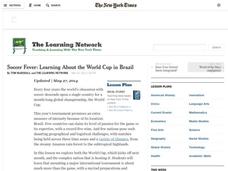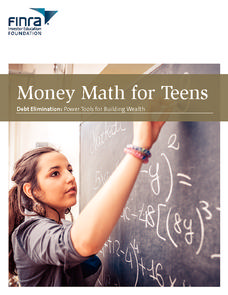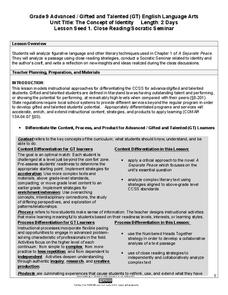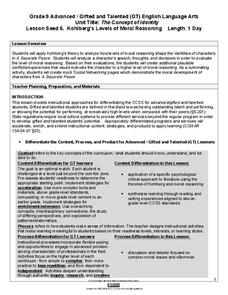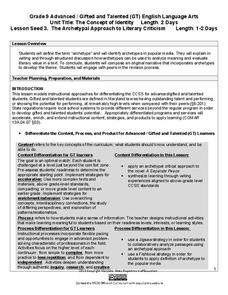K12 Reader
Ecosystems
Examine how living and non-living things work together in a reading passage about ecosystems. Class members read the text and then respond to five response questions that relate specifically to the content of the passage.
Curated OER
No More Traffic Jams: Lesson 3
Traffic is a very real concern for any Urban dweller. After watching a video showing various traffic issues and solutions, learners group up to discuss and develop innovative traffic solutions of their own. They explore vocabulary and...
Curated OER
Physical Education Unit Plan: Soccer - Lesson 10
The concluding lesson in this four-star series is World Cup day! Players come dressed in the colors of the country they are representing for the World Cup tournament. The rules for the mini-games in this tournament are modified to allow...
National Geographic
Altitude: What's in the Air?
Introuduce your scientists to the differences in air at varying altitudes with a colorful explanatory graph. After some discussion, they view unbelievable footage of mountain-climbing Leo Houlding and a narrative about how he might do...
Key Stage Fun
Squeebles Times Tables 2
The Squeebles are back, and this time they are ready to help young mathematicians gain fluency in their multiplication skills. This app allows for practice and testing through a number of fun, and at times, challenging, educational games.
ARKive
Animal over Winter
Gosh those polar regions can get cold. So, how do the animals that live there survive the long winters? Learners explore how animals adapted to survive harsh wintry conditions by completing a worksheet and comparing animal survival...
Illustrative Mathematics
Running on the Football Field
Make your class into Pythagorean theorem fanatics in no time. What a great resource to get your sports enthusiasts into the math game! Read the commentary so you can you can strategize how to apply the three math practices.
Howard Hughes Medical Institute
Winogradsky Columns: Microbial Ecology in the Classroom
Winogradsky columns are ideal for observing the role of bacteria and other microorganisms in an ecosystem. This student activity guide is complete with data tables for observations and analysis questions for processing what was observed....
The New York Times
Soccer Fever: Learning About the World Cup in Brazil
What an incredible collection of ideas for teaching about the 2014 World Cup in Brazil! This resource is packed with news articles and instructional activities on a wide variety of topics, from the global popularity of soccer and the...
Curated OER
Minerals of the Earth
Unearth this gem of a resource to use in your geology unit! With colorful images, bullet-point text, and links to related videos, it deals with the characteristics, properties, and identification of minerals. There are also slides...
Wordpress
Paper Doll Project
Explore self and social construction with a hands-on art project. After studying and discussing bullying and other social experiences, individuals create three paper dolls that represent specific social constructions. Included here is a...
Money Math for Teens
Debt Elimination - Power Tools for Building Wealth
What does it mean to be wealthy? Your learners will consider how carrying debt affects budgeting, and learn about the debt snowball strategy and how is it used in the concept of eliminating debt in order to build wealth.
Holiday Zone
Months and Seasons
Tis' the season to develop children's fine motor skills with this simple handwriting worksheet.
Learning Zone Express
The Basics of Sewing
This resource is a stitch. Kids learn the basics of hand and machine sewing, how to sew on buttons, how to construct and repair clothing, and how to use patterns to create decorative ornaments.
Curated OER
Chalk Chromatography
Your chemistry class is sure to love this experiment on column chromatography, as demonstrated with chalk sticks and felt tip markers. Pupils use sidewalk chalk (another inexpensive form of chalk stick) to demonstrate adsorption and the...
Pedago Net
Acing Math
Deal me in! Elementary and middle school classes will love this selection of math games, all involving a deck of cards. From fractions to exponents to rounding up and down, the games cover such a variety of skills that your classroom...
Maryland Department of Education
The Concept of Identity Lesson 1: Close Reading/Socratic Seminar
John Knowles' A Separate Peace provides readers with an opportunity to develop their close reading and analytical skills as they look for what Knowles feels are the factors that shape our identity.
Maryland Department of Education
The Concept of Identity Lesson 2: The Historical/Biographical Approach
"How does our environment shape our identity?" After researching biographical information about John Knowles and considering how these experiences are reflected in A Separate Peace, class members consider the strengths and weaknesses of...
Maryland Department of Education
The Concept of Identity Lesson 5: Motivation - Maslow's Hierarchy of Needs
Maslow's Hierarchy of Needs provides the lens class members use to analyze and evaluate the motivations of the characters in Sylvia Plath's "Initiation" and scenes from Mean Girls. Readers then select a character from A Separate...
Maryland Department of Education
The Concept of Identity Lesson 6: Kohlberg's Levels of Moral Reasoning
How does our moral reasoning shape our identity? After a study of Kohlberg's Levels of Moral Reasoning, readers use Kohlberg's theories to analyze the speech, thoughts, and decisions of a character in A Separate Peace. They then create...
Maryland Department of Education
The Concept of Identity Lesson 7: Logical Fallacies
What are the effects of competition in an academic environment? The competition between the main characters in A Separate Peace motivates a series of activities that asks readers to take a stance on competition, and then to develop a...
Maryland Department of Education
The Concept of Identity Lesson 8: Propaganda in Visual Media
Visual and print propaganda are featured in a lesson that asks readers of A Separate Peace to examine the techniques used in propaganda from World War I, World War II, presidential elections, and in the novel.
Maryland Department of Education
The Concept of Identity Lesson 3: The Archetypal Approach to Literary Criticism
As class members continue their study of approaches to literary criticism, readers examine the symbolism and archetypal patterns in John Knowles' A Separate Peace, and how these parallels are used to develop a theme in the story.
Maryland Department of Education
The Concept of Identity Lesson 4: The Psychological Approach
Readers apply Sigmund Freud's theories of the unconscious mind and the psychological approach to literary criticism to analyze and evaluate the relationship between two characters in A Separate Peace.
Other popular searches
- Time Zones
- Time Zone Lesson
- Intertidal Zone Food Web
- Coastal Zones
- Ocean Zones
- Subduction Zones
- Intertidal Zones
- Calculating Time Zones
- Marine Science Zones
- Abyssopelagic Zone
- Beach Zones
- Bathypelagic Zone










